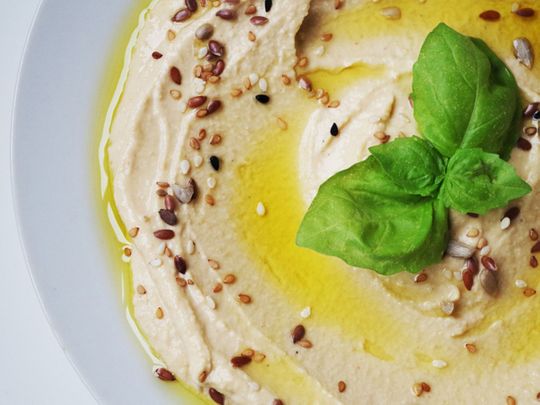
Dubai: Turns out humus is so well loved, that every year on May 13th, the creamy dip gets an entire day of appreciation. Observing international hummus day makes plenty of sense. Why? Well, because hummus is delicious, nutritious and eaten by people all over the world.
In celebration of this special day, we explore the controversial origin story of this ancient dish and try to find out exactly where it was discovered.
First, let us delve, pita first, into the definition. Hummus is a spread or dip that is made by mashing cooked chickpeas and blending them with tahini, olive oil, lemon juice, garlic and salt. The full name of the prepared spread in Arabic is ‘hummus bil tahina’, which means 'chickpeas with tahini’. Pretty straightforward. Love it.
Everyone from the Lebanese to the Palestinians, Egyptians and Syrians have tried to claim it as their own creation. The origins of hummus have actually caused many heated discussions among Arabs, as well as with Israelis and Greeks, who have been trying to weasel their way into the conversation of ‘who invented hummus’ for the past few decades.
For Palestinians, the Israeli’s public entitlement to hummus was a particularly heightened point during the Palestine-Israel conflict, in which Israel had managed to spread their occupation on to Palestinian dinner plates. Something the Palestinians thought was unacceptable. They are emotionally attached to hummus as an ‘Arab’ dish, and Israelis should not claim it belongs to them. But a small bit of doubt always lingers in the back of our minds... could it be an Israeli creation?
Well, let’s set the record straight
There is no specific and hard evidence that states the exact origins of the creation of hummus. However, some findings claim that the idea of mashing chickpeas was first discovered in Egypt. According to Lilia Zaouali, the author of ‘Medieval Cuisine of the Islamic World’, the earliest known written recipes for a dish resembling hummus bil tahina, were recorded in cookbooks written in Cairo in the 13th century.
A recipe for a ‘cold purée of chickpeas with vinegar and pickled lemons topped with herbs, spices, and oil appears, in an old Egyptian cookbook called ‘Kenz al-Fawa'id Fi Tanwi' Al Mawa'id’. Nevertheless, key elements are missing in this recipe including tahini and garlic, which would technically not qualify the aforementioned dish as the hummus we know and love today.
So we turn to an expert
Greg Malouf the famed Lebanese-Australian, consulting chef of Phoenicia Dubai and a man recognised as being an authority on Middle Eastern cuisine told Gulf News, “The origins of hummus is one of the great food mysteries we have debated for centuries. Having a Lebanese background I’d like to says hummus originated in Lebanon but historically it was the Egyptians that brought us the famous dip.”
This fact may come as a surprise to many. People don’t really associate the unmissable appetiser with Egyptian cuisine. Egyptians own kushari, foul, falafel and molokhiya. Hummus… well not so much. Why? Because (and as an Egyptian I can say this) we didn’t really give it the treatment it deserved. So maybe don’t order hummus if you’re ever in Egypt.
Fellow Egyptians would agree with that slightly mean, but true, statement. “Based on the little research I’ve done, some texts claim hummus was born in Egypt,” Salma El Shahed, a foodie and hummus enthusiast told Gulf News. “With that said, and with all due respect to chefs in the culinary scene of Egypt, we certainly did not give hummus the admiration that it thankfully received in the Levant. When I think of hummus I think of the pillowy and smooth dip that’s served in white bowls in Palestinian and Lebanese restaurants. Not the sad, beige puddle usually served on my Egyptian table.”
Salma’s favourite hummus spot in Dubai? "Safadi for a budget hummus and Em Sherif for a splurge hummus." Both Lebanese locations unsurprisingly.
After speaking to an Egyptian, we zeroed in on someone from the Levant. “What I am going to say, will sound very controversial, especially given that I am originally from Palestine,” said Khalid Saleh, a Palestinian-American, who has a degree political science and has a passion for Middle Eastern history. “My theory (and this is purely a theory), is that hummus is actually of Jewish origins. The reasoning behind why I am saying that is based on some Ayat in the Quran. If you look at Aya 61, in Surat al Baqara, you see th story of how Israelites are telling Moses that they cannot endure living with just one kind of food. So they requested herbs, cucumbers, garlic and legumes. To me some of these are a basic recipe of hummus, so I think they definitely combined those ingredients and enjoyed some form of hummus back then.”
His theory is backed up. Aya 61 in Surat Al Baqara says this: ‘O Moses, indeed we cannot endure but one kind of food; pray, then, to thy Sustainer that He bring forth for us aught of what grows from the earth - of its herbs, its cucumbers, its garlic, its legumes, its onions.’
After emailing with a Syrian living in the UAE, Haia Machfij wrote to Gulf News in capital letters. “MY MOTHER SAID HUMMUS WAS INVENTED IN SYRIA!” Well, we can’t argue with Haia’s mother. Her favourite hummus spots in Dubai? “I love Daraj Al Yasmine and Hamidyes hummus.”
Now, we move on to a Lebanese national. Zahra Hachem told Gulf News, “I think many people automatically think that hummus is Lebanese. Lebanon did a great job at branding itself as the country of hummus. They truly worked on the recipe to make it taste really special, but I can’t say for sure who first created it. It’s not exactly well known.” Zahra’s favourite hummus spots in Dubai? “Safadi is amazing. Mama Esh has bomb hummus and I love Bait Maryam too.”
Our final stop, a Lebanese-Palestinian, Karim Nasr, who favours his Lebanese hummus to the Palestinian kind. “My Palestinian side would hate me for saying this, but I think it’s definitely a Lebanese specialty. Or they’ve perfected it at least.” Karim’s favourite hummus spot? “Safadi by far. Their Beiruti hummus is fire!”
So to answer our question
There are clearly multiple theories about the origins of hummus. What we do know is that it was definitely discovered in the Middle East; however, the evidence is insufficient to determine the precise location or time of the first creation of hummus
Lebanese food expert and Head Chef at Al Nafoorah, Ali Fouad argues that Lebanon is fast becoming the modern day home to hummus. “While historically the dish has been consumed by sultans, pharaohs and many other Levantine civilizations, it carries a central place in Lebanese cuisine today. The rich history and nutritional value even caught the attention of philosophers like Plato – the journey of hummus has come a long. I believe it is a perfect complement to all types of food – from main dishes where like meat grills where you dip the kabab into the hummus or the simplicity of dipping Arabic bread in hummus as a starter in Lebanese mezzeh.”
Chef Ali’s favourit hummus spot? Unsurprisingly, at his own restaurant. “It has to be the hummus we make at Al Nafoorah in Jumeirah Emirates Towers. We specialise in the Beiruty style hummus, which is made with extra tomatoes, parsley and garlic. The hummus variation that comes from Beirut is quite distinct and one of the most popular hummus preparations.”
Lebanon has even made their love for hummus official. Like… by involving the government.
In 2008, Fadi Abboud, the then-president of the Lebanese Industrialists Association told the Associated Press that he petitioned to the Lebanese Ministry of Economy and Trade to request protected status from the European Commission for hummus as a uniquely Lebanese food. As of 2009, the Lebanese Industrialists Association was still "collecting documents and proof" to support this claim.
Making your hummus better
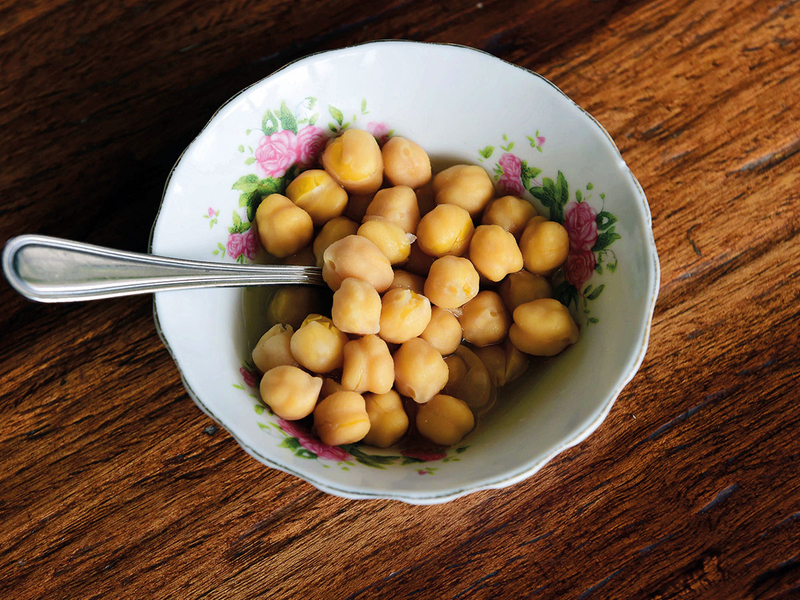
According to Greg Malouf, hummus should have the characteristics of creaminess and nuttiness. It should be garlicky, and lemony. “It should be silky and most importantly it should be over-powered by tahini!”
“I’ve developed a better method of making hummus, which is:
Soaking the chickpeas with lots of baking soda, rinsing vigorously and cooking the chickpeas until they almost form a porridge, then letting them chill.
It helps to have a very powerful blender. I also add a block of ice or two and whip canola oil at the end, which give it a glossy character. Mum used the old pressure cooker method when cooking chickpeas and if she wasn’t in the mood would open a can.”
If for some reason you forget to soak your chickpeas the night before, then a “quick soak” will be sufficient. Rinse and drain the dried chickpeas and place them in a pan with twice their volume of fresh cold water. Bring to the boil and cook rapidly for several minutes. Remove them from the heat, and leave them to soak for four hours before draining and cooking.
Mantoushe will be offering an exclusive Hummus Collection on Deliveroo where customers will be able to order a range of six hummus flavours all in one for Dh39.






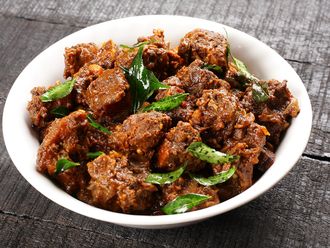
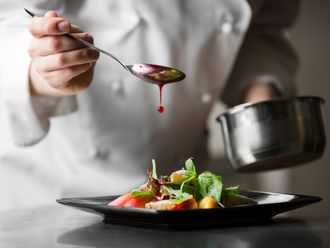
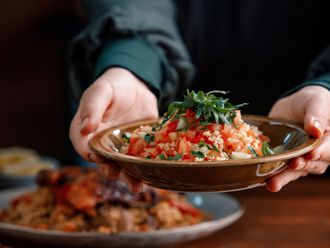



![Copy of 562337-01-02 [1]-1731263666881](https://imagevars.gulfnews.com/2024/11/10/Copy-of-562337-01-02--1--1731263666881_193175b1ad8_small.jpg)



